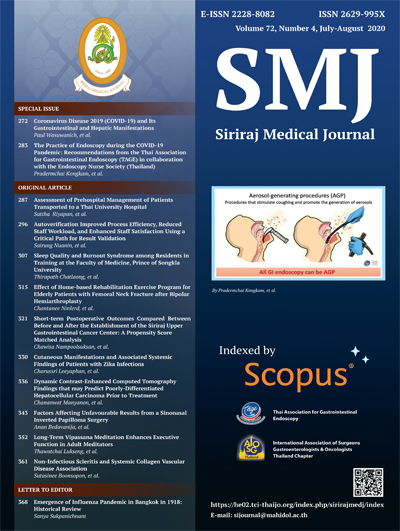The Practice of Endoscopy during the COVID-19 Pandemic:Recommendations from the Thai Association for Gastrointestinal Endoscopy (TAGE) In collaboration with the Endoscopy Nurse Society (Thailand)
DOI:
https://doi.org/10.33192/Smj.2020.38Keywords:
COVID-19, endoscopy, coronavirus SARS-CoV-2, Thailand, aerosol generating procedure, Thai Association for Gastrointestinal Endoscopy (TAGE), enhanced personal protective equipment (PPE), patient(s) under investigation (PUI), Endoscopy Nurse Society (Thailand) (ENST)Abstract
For management of endoscopy units during the worldwide coronavirus disease 2019 (COVID-19) outbreak caused by the new coronavirus SARS-CoV-2 in Thailand, a working group of the Thai Association for Gastrointestinal Endoscopy (TAGE) in collaboration with the Endoscopy Nurse Society (Thailand) (ENST) has developed the following recommendations for Thai doctors and medical personnel working in gastrointestinal endoscopy (GIE) units.
Upper and lower GIE is considered as an aerosol generating procedure (AGP). Information regarding chance of infection in patients must be obtained before performing endoscopy to help determine the level of risk. Endoscopies should only be performed in emergency/urgency cases. Hospitals that have no confirmed cases and do not have a high incidence in their coverage area may consider performing selective endoscopies.
For the confirmed infected patient, the recommendations are as follows; the endoscopist who performed the procedure must be an experienced one, wear the enhanced personal protective equipment (PPE) with correct practice how to wear and take off PPE, and strict hand hygiene. The endoscopic procedure should be performed in a negative pressure room; however, If not available, a bedside procedure in the cohort ward should be performed. Endotracheal tube intubation and removal should be done by an anesthesiologist. Most enzymatic detergent solutions can eliminate SARS-CoV-2. The use of an additional pre-cleaning process in order to prevent AGP from occurring during endoscope reprocessing is recommended.
Patient(s) under investigation (PUI) should wait for the test result before considering endoscopic procedure. For the low risk patient for COVID-19 infection who needs an endoscopic procedure, standard PPE is recommended. Due to the limitation of medical resources, only medical personnel who are necessary for the procedure and at risk of COVID-19 infection should be allowed to use the recommended PPE.
References
2. Gu J, Han B, Wang J. COVID-19: Gastrointestinal manifestations and potential fecal-oral transmission. Gastroenterology [Internet]. 2020 Mar 3; Available from: http://dx.doi.org/10.1053/j.gastro.2020.02.054
3. Song Y, Liu P, Shi XL, Chu YL, Zhang J, Xia J, et al. SARS-CoV-2 induced diarrhoea as onset symptom in patient with COVID-19. Gut [Internet]. 2020 Mar 5; Available from: http://dx.doi.org/10.1136/gutjnl-2020-320891
4. Xiao F, Tang M, Zheng X, Liu Y, Li X, Shan H. Evidence for gastrointestinal infection of SARS-CoV-2. Gastroenterology [Internet]. 2020 Mar 3; Available from: http://dx.doi.org/10.1053/j.gastro.2020.02.055
5. Soetikno R, Teoh AYB, Kaltenbach T, Lau JYW, Asokkumar R, Cabral-Prodigalidad P, et al. Considerations in performing endoscopy during the COVID-19 pandemic. Gastrointest Endosc [Internet]. Available from: https://doi.org/10.1016/j.gie.2020.03.3758
6. Johnston ER, Habib-Bein N, Dueker JM, Quiroz B, Corsaro E, Ambrogio M, et al. Risk of bacterial exposure to the endoscopist’s face during endoscopy [Internet]. Vol. 89, Gastrointestinal Endoscopy. 2019. p. 818–24. Available from: http://dx.doi.org/10.1016/j.gie.2018.10.034
7. Chapman S. Hot air? BMJ: British Medical Journal: International Edition [Internet]. 2001;323(7327):1449–1449. Available from: https://elibrary.ru/item.asp?id=4282221
8. Join ABE, Partner AI, Edge AL. JOINT GI SOCIETY MESSAGE: COVID-19 Clinical Insights for Our Community of Gastroenterologists and Gastroenterology Care Providers. Available from: https://www.asge.org/home/joint-gi-society-message-covid-19
Downloads
Published
How to Cite
Issue
Section
License
Authors who publish with this journal agree to the following conditions:
Copyright Transfer
In submitting a manuscript, the authors acknowledge that the work will become the copyrighted property of Siriraj Medical Journal upon publication.
License
Articles are licensed under a Creative Commons Attribution-NonCommercial-NoDerivatives 4.0 International License (CC BY-NC-ND 4.0). This license allows for the sharing of the work for non-commercial purposes with proper attribution to the authors and the journal. However, it does not permit modifications or the creation of derivative works.
Sharing and Access
Authors are encouraged to share their article on their personal or institutional websites and through other non-commercial platforms. Doing so can increase readership and citations.















